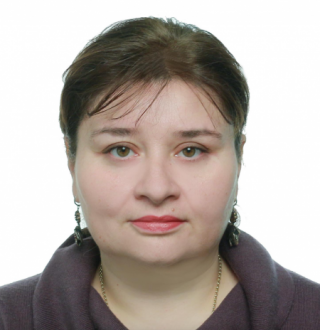South Caucasus Conflict Resolution
South Caucasus Conflict Resolution
 S-CAR welcomed a new Visiting Fellow for the Spring semester, Ms. Dina Alborova, a Professor at the South Ossetian State University’s Department of Political Science and Sociology. Dina is working with an APT Team on South Caucasus conflict resolution, learning about the pedagogy of conflict resolution and about religion and conflict resolution. According to Dina, she is the first person in many decades to have left South Ossetia for a fellowship in the United States.
S-CAR welcomed a new Visiting Fellow for the Spring semester, Ms. Dina Alborova, a Professor at the South Ossetian State University’s Department of Political Science and Sociology. Dina is working with an APT Team on South Caucasus conflict resolution, learning about the pedagogy of conflict resolution and about religion and conflict resolution. According to Dina, she is the first person in many decades to have left South Ossetia for a fellowship in the United States.
S-CAR has a long history working with Georgians and South Ossetians in support of conflict resolution and reconciliation in the region. In August 2008, the Georgian, South Ossetian, and Russian militaries fought over the territory of South Ossetia. Georgia lost that war and continues to claim South Ossetia is part of Georgia, and most countries recognize Georgia’s claim for territorial integrity. But Russia, Venezuela, and Nicaragua recognize South Ossetia as an independent country, and South Ossetia continues to seek broader international recognition. With Dina’s help, S-CAR is planning a conference on the Georgian-South Ossetian conflict.
Barely four weeks into Dina’s visit to S-CAR, I had the privilege of interviewing her. Dina expressed her profound thanks and appreciation to Christopher Joyce, UK Regional Advisor for the Caucasus on Conflicts and post-Conflict Issues, for graciously arranging UK sponsorship of her visit to S-CAR. She also lauded S-CAR for warmly welcoming her and for supporting the ongoing Georgian-South Ossetian reconciliation process. She said, “South Ossetians cherish S-CAR’s peace initiatives and view the school’s peacebuilding methodology as an opportunity to discuss issues between the two countries – Georgia and South Ossetia.”
Dina is clearly a patriotic South Ossetian. In her opening comments of gratitude, she referred immediately to Georgia and South Ossetia as separate countries. Most Georgians would refer to South Ossetia as part of Georgia. This question of sovereignty is at the heart of the Georgian-South Ossetian conflict.
Charles: What do you hope to accomplish during your time at S-CAR?
Dina: I will write about the conflict and meet with experts on the South Caucasus, the Middle East, Russia, and also prepare for the upcoming conference scheduled for April 2016. I am also excited to understand new approaches to pedagogy. Teaching methodologies here have a different teacher-student relationship. Experiencing the S-CAR ways of teaching will help me in my teaching at home.
Charles: What is the conference you are preparing?
Dina: The Cost of Conflict conference will be in Europe in April. It will bring together participants from Georgia, South Ossetia, Russia, the United States, and other European countries that will discuss this South Caucasus conflict, and recommend a road map for peace. I am writing an article that will be part of the collection I am co-editing on Cost of Conflict.
Charles: What do you see as constructive approaches to the Georgian-South Ossetian conflict?
Dina: One of the successful ways to end the Georgia- South Ossetia conflict is to give due recognition to the existence of South Ossetia as a nation state. The recognition of South Ossetia’s statehood will eventually provide avenues for South Ossetia’s representation in international organizations, and also set the stage for its participation in international conferences to discuss the issues and problems affecting the country and its people. South Ossetians exist and must be accorded all of the basic humans rights enshrined in international protocols.
Charles: What do you want Americans to know about South Ossetia?
Dina: I want to tell Americans that the small, beautiful country of South Ossetia wants to live in peace with everyone. Its unique traditions, culture, and history have been marred by bloodshed and destruction during the last 10 years of the Georgian-South Ossetian conflict. Secondly, South Ossetia needs access to the international community through such institutions as the UN, OSCE, Council of Europe, etc. This is most important when the Georgian-South Ossetian conflict is discussed, including such issues as refugees, human rights, missing persons, etc. At these forums, there are only Georgian voices, and Georgian versions of events. There is no presentation of South Ossetian views. The argument that is offered to explain why South Ossetians are not invited to such forums, even when the forums are about issues that directly involve us, is that we are not recognized. So, when we want to discuss the problems of partial recognition, we cannot get to the forums to have that discussion because we are not recognized. These same problems can be seen in our lack of freedom of movement and lack of access to international mechanisms for the protection of human rights.
Charles: What has surprised you during your first few weeks at S-CAR?
Dina: I have culture shock. I was so surprised to see tax added onto the price of an item. At home, the price includes the tax. During my first week I wanted to visit a class, but I got lost and was 10 minutes late to the class. The professor was so surprised to learn that I sat outside the classroom for two hours, waiting for a class break so that I could enter the classroom without being disrespectful. Also, I’ve enjoyed seeing how classes are structured. The interactive classroom here makes students think critically and increases mutual respect between teachers and students.
Thank you to SCAR’s PhD candidate Margarita Tadevosyan, who interpreted for the interview.




